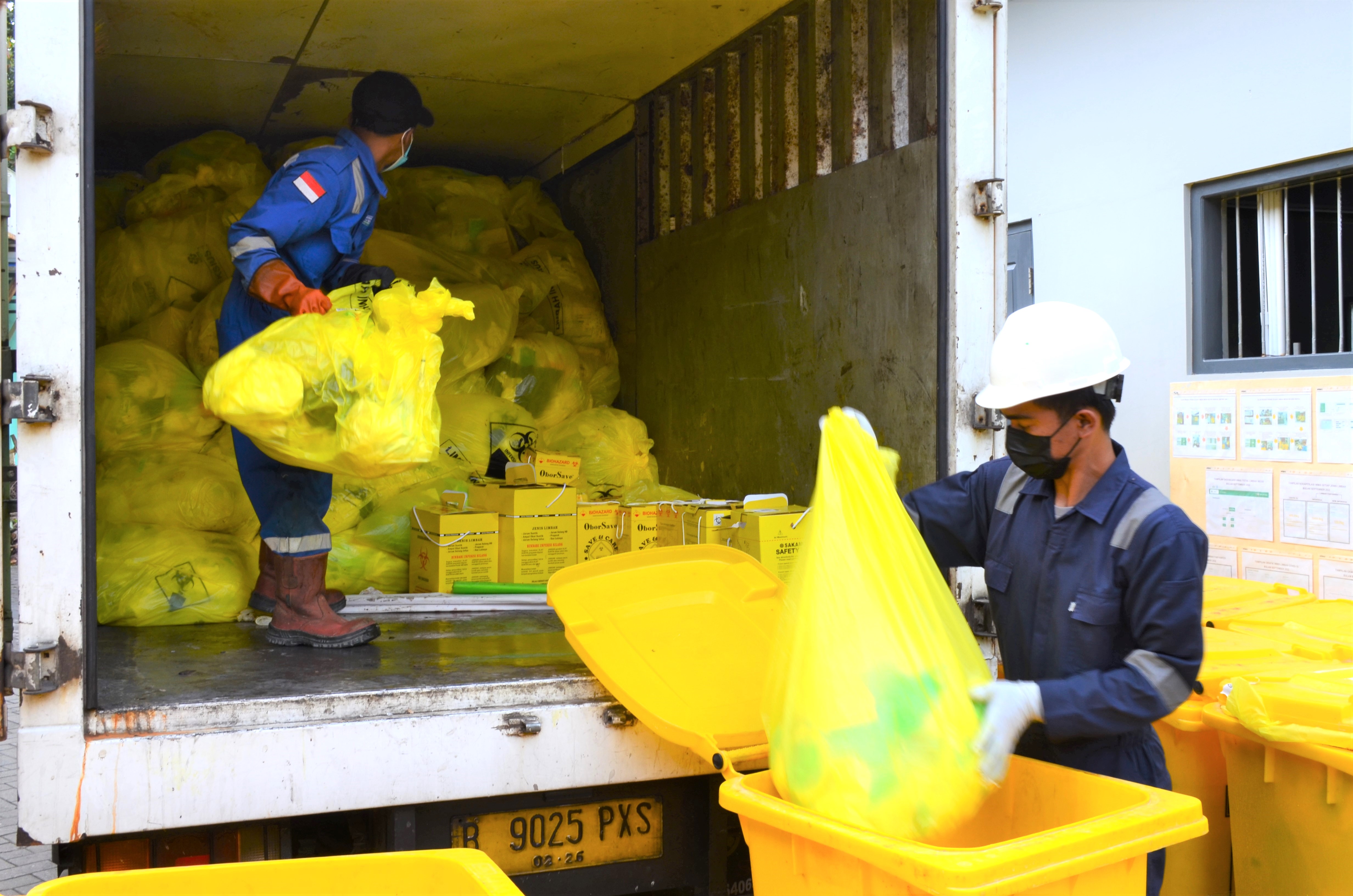By Vidia Darmawi, Technical Specialist at UNDP Indonesia, Virgi Fatmawati, Knowledge Management and Learning Associate at UNDP Indonesia, and Mashida Rashid, Regional Project Coordinator at UNDP Bangkok Regional Hub
Harnessing Innovation: ME-SMILE and South-South Cooperation in Health Care Waste Management
June 15, 2023

Health care waste is collected and transported at Dr. Sardjito General Hospital in Yogyakarta.
Since the COVID-19 pandemic started in early 2020, the volume of hazardous health care waste (HCW) has increased dramatically worldwide. For Indonesia, the world’s fourth most populated country with more than 273 million people, tackling this rapid increase in HCW across its health care facilities has become an urgent priority.
Data from the Indonesian Ministry of the Environment and Forestry (MOEF) showed that the estimated total HCW being generated across its nearly 12,000 health care facilities – which includes face masks, personal protective equipment, vaccine vials, syringes, swabs, bandages and tests – reached 18,460 tons during the peak of the pandemic in mid 2021, nearly a third of which was COVID-19 infectious waste.
Health care waste can have significant impacts both on human health and the environment. Improperly managed health care waste is a significant source of pollutants – untreated health care waste in open dumps and landfill sites can cause soil and water contamination, while inadequate incineration of medical waste can lead to the release of persistent organic pollutants.
In response to the pressing need, in July 2021 the government made a significant commitment by announcing an allocation of IDR 1.3 trillion (equivalent to just under US$100 million) for nationwide initiatives aimed at enhancing the management of HCW in a swift and systematic manner. The Ministry of Health (MOH) and the Ministry of Environment and Forest (MOEF) are jointly spearheading this endeavor.
The HCW management system has come under immense strain caused by the COVID pandemic. To cope with the increased demand, there has been a significant rise in the number of private service providers. However, this had led to fragmented HCW management operations. It is also evident that the geographic distribution of HCW treatment facilities is uneven, with most concentrated in Java. Effective HCW management has also been hindered by the lack of an adequate monitoring system.
To help tackle this challenge, the United Nations Development Programme (UNDP) stepped in to provide technical support to the MOH to develop ME-SMILE, a digital monitoring system for HCW. In Indonesia, UNDP has supported the government on the successful Sistem Monitoring Imunisasi Logistik secara Elektronik (SMILE), and SMILE Malaria.
Following a successful pilot in 2022, the first phase of ME-SMILE launched in March 2023 with implementation in 30 hospitals across 4 provinces. The aim is for the initiative to be scaled up in a second phase in 2024 to cover all 1,000 government hospitals as well as private hospitals.
The system provides traceability of each medical waste bag via a QR code, accurate weighing with Internet of Things (IoT)-based digital scales, and real-time data record keeping through a mobile and web-based application. It also vastly reduces the time needed for weighing, collecting and transporting medical waste, from 3 hours to only 30 minutes.
ME-SMILE tracks HCW streams from the point of generation to the point of treatment, where the system then links to the MOEF’s existing waste monitoring system, SIRAJA. The systems’ interoperability not only helps to effectively manage HCW, but it also provides key data analytics to the government to better predict and manage anticipated surges in HCW during health emergencies.
Medical waste management is a multifaceted process which involves multi-sectoral cooperation. The graph below illustrates the six stages and division of responsibilities that have been established between the two leading technical ministries on HCW management in Indonesia:

Medical waste management is a multifaceted process which involves multi-sectoral cooperation.
While the COVID-19 pandemic has strained capacities of health care systems, it has also created opportunities for innovation, and has opened doors for South-South cooperation among countries who are facing similar challenges and seeking to deliver clean, sustainable solutions for HCW management.
Recently, a virtual workshop was organized to share the knowledge and experience in Indonesia through the ME-SMILE system with counterparts in Bangladesh, Bhutan and the Maldives who are involved in a UNDP-led project on HCW management in Southwest Asia that is supported by the Government of Japan.
The workshop provided in-depth information on the ME-SMILE system’s complexities and functionality, as well as the challenges and lessons learned. It was an excellent opportunity for other countries to learn how a digital system for end-to-end HCW management – from monitoring waste loads to the final disposal – could be set up.
The workshop also examined policy and governance aspects of HCW management, which are central to the adoption of effective HCW management practices and in turn, the implementation of the appropriate digital solutions.
The South-South exchange enabled the transfer of knowledge and implementation experience of ME-SMILE. UNDP supports such exchanges to facilitate the rapid introduction and scale up of innovative solutions across countries. It is a key element of UNDP’s approach to strengthening capacities in low- and middle-income countries to design and adopt context-driven digital solutions, to contribute towards positive outcomes for the health of people and the planet.

 Locations
Locations




